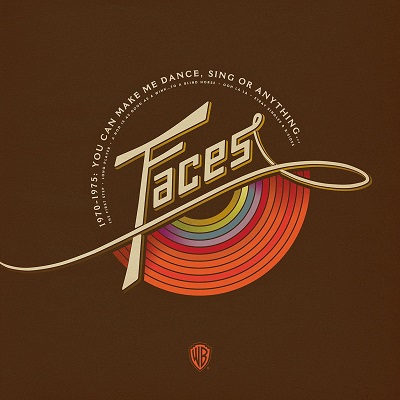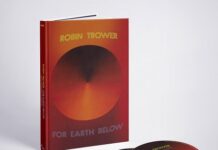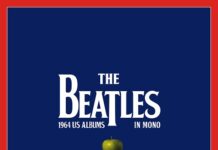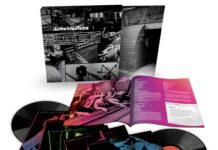Faces were one of a handful of supergroups to emerge in the late 60s. Often mistaken for the backing band of Rod Stewart, whose solo career became more commercially viable, Faces brought former Small Faces members Kenney Jones (drums), Ronnie Lane (bass) and Ian McLagan (keyboards) together with former Jeff Beck Group members Stewart and guitarist Ronnie Wood. Over five years, they released four albums and toured regularly until Wood got the call to join the Rolling Stones. The writing was already on the wall. Lane left in 1973, Jones would later replace Keith Moon in the Who, McLagan would eventually join Wood as a sideman with the Stones, and Stewart became a jetset superstar whose rock and roll credentials will forever be linked to Faces. Just track through 1970-1975: You Can Make Me Dance, Sing Or Anything… and you’ll hear Stewart at his rockin’ best.
The 1970-1975: You Can Make Me Dance, Sing Or Anything…box set features newly remastered versions of all four of the Faces’ studio albums — First Step (1970), Long Player (1971), A Nod Is As Good As A Wink…To A Blind Horse (1971), and Ooh La La (1973) — plus a fifth disc of rarities, stray singles and B-sides. Listening to these fives discs, you won’t hear much deviation from the band’s patented formula of soulful, blues-based rock with a ragtime feel and a steady beat in your heart. Why mess up a good thing?
The debut First Step was credited to Faces in the UK and Small Faces in the U.S. It did little to move the group up the ladder, but the remaster reveals an endearing collection of tunes. In keeping with the trend of covering Bob Dylan, the album opens with “Wicked Messenger,” and both McLagan and Wood assert their muscle before Stewart springs into the action with Jones and Lane in his pocket. The thoughtful blues n’ gospel that drives “Devotion” is another sign of the group’s potential.
As the tumbling rhythm of “Shake, Shudder, Shiver” comes booming along, the band’s alchemic blend just begins to percolate. “Flying” is often cited as the album’s most powerful song with each part of the machine falling into place. “Stone,” “Around The Plynth” and the instrumental “Looking Out The Window” mar the focus somewhat, even as they highlight the group’s exceptional musicianship. “Three Button Hand Me Down” takes a final bow before the bonus tracks roll out, and the punch of an outtake called “Behind The Sun” knocks you on your ass. Just goes to show there’s often magic left on the cutting room floor. The rest is negligible, although the alternate versions of “Flying” and “Nobody Knows” are definitely worth sampling.
As a sophomore release, Long Player tidied up the arrangements and, despite a selection of mostly original compositions, featured an alluring live cover of Paul McCartney’s “Maybe I’m Amazed.” Setting the mood, “Bad N’ Ruin” infectiously captures the sandpaper rasp of Stewart’s voice, rubbing up anxiously against Wood’s ringing chords and McLagan’s staunch keys. The breezy intonation of “Sweet Lady Mary,” smothered in an intoxicating broth of McLagan’s nimble-fingered Hammond work and Wood’s masterful strokes on the pedal steel, is a perfect reflection of Faces’ inimitable style. From there, Ronnie Lane takes the lead vocal on “Richmond,” and exchanges slides with Wood in blues-soaked ecstasy.
The inclusion of a live “Maybe I’m Amazed” instead of the studio single released before Long Player is as brilliant as it is confounding. When you throw in the other live track, Big Bill Broonzy’s “I Feel So Good,” you get an eye-opening glimpse into the band’s on-stage chemistry. All this and Stewart was on his way to becoming a pop star — just not yet fully committed to the tawdry pull of the Top 40 checkerboard. Even those horns on “Had Me A Real Good Time” fail to diminish the raunchy attack. Out of the extras, an instrumental called “Sham-Mozzal” is Faces at their purest, while a live version of Robert Johnson’s “Love In Vain” is Rod Stewart at his rawest.
For A Nod Is As Good As A Wink…To A Blind Horse, Glyn Johns came on as co-producer, resulting in a better mesh of material and a hit single with “Stay With Me,” to this day the definitive Faces rocker. When the album dropped, Rod Stewart had already broke into the hit parade with a Number One album (Every Picture Tells A Story) and single (“Maggie May”), so the stage was set for Faces to break through on the UK and US charts. The album peaked inside the Top 10 and went gold, becoming Faces’ most successful album.
Lifting off with “Miss Judy’s Farm,” Faces’ sound tightens, blossoming into a thoroughly jaunty and joyful romp with Ron Wood striking the right chords and Ian McLagan’s Wurlitzer piano firmly embedded in the groove. Those roles come to the forefront on “Stay With Me,” adding a raucous, festive step to the group’s stride. They were already earning a reputation for having too much of a good time, and the deliberate wallop of “Stay With Me” pretty much sealed the deal.
A ballad like “Love Lives Here” sounds almost indistinguishable from a Rod Stewart solo number. Ronnie Lane takes the lead vocals on three of album’s mid-tempo tracks — “You’re So Rude,” “Last Orders Please” and “Debris.” A sedate cover of Chuck Berry’s “Memphis” solidifies the band’s chemistry, but little else. “Too Bad” and “That’s All You Need,” the album’s other stompers, resonate with Wood’s snappy, Stones-like riffs and slide work, respectively. As for the extras, versions of “Miss Judy’s Farm” and “Stay With Me” from the BBC underscore how supercharged the band was on A Nod Is As Good As A Wink…To A Blind Horse.
For Ooh La La, their fourth and final studio album, Faces handed the producer reigns to Glyn Johns and set about to reconvene in the midst of Stewart’s rise as a solo artist. It wasn’t easy as the singer was absent from many of the album’s early sessions. Lane took the lead where and when he could, but was reportedly so put off by playing subordinate to Stewart that he left the band shortly after the release of Ooh La La. Nevertheless, the record, while receiving poor reviews partly prompted by Stewart’s negative comments, has its highpoints.
The idea was to follow its predecessor in a similar style, and there are certainly a few moments that do just that. “Silicone Grown” is straightforward rock and roll, although “Borstal Boys” arguably serves the same purpose with a little more conviction. “Cindy Incidentally,” released as a single in the UK where it became Faces’ biggest charting hit, and “Just Another Honky,” fall more in line with where Stewart was heading with his solo career. Of course, the album’s title track belongs to Wood, in a rare lead vocal, and Lane, who co-wrote the song with the guitarist. Stewart’s involvement with it was more or less nil.
There’s BBC sessions and outtakes included on the remastered Ooh La La, but the live take of John Lennon’s “Jealous Guy” is likely the strongest entry. Speaking of solo Beatles songs, that elusive studio version of “Maybe I’m Amazed” makes an appearance on the set’s fifth disc with the fitting title of Stray Singles & B-sides. “Pool Hall Richard,” a B-side of the “Ooh La La” single, is more Chuck Berry style rock. A live “I Wish It Would Rain” from the 1973 Reading Festival brings Stewart, Wood and McLagan together in total sync. Stewart shines on “You Can Make Me Dance, Sing Or Anything (Even Take The Dog For A Walk, Mend A Fuse, Fold Away The Ironing Board, Or Any Other Domestic Short Comings),” the band’s final single that still retains the record as a charting UK hit with the longest title.
This fifth disc is also filled with a few instrumentals — “Rear Wheel Kid,” “Oh Lord I’m Browned Off” and “Skewiff (Mend The Fuse)”— that indiscriminately remind everyone that the players were more than a mere backing band behind Rod Stewart. The fall-down drunken feel of the mostly instrumental “Dishevelment Blues” goes one further to highlight their quirky sense of humor. Which is what it really comes down to: Good time rock and roll with a nod and a wink. That’s what Faces were pretty much about. Sadly, with Lane and McLagan gone, the full band never worked together again. Partial reunions and their 2012 induction into the Rock & Roll Hall of Fame have given rise to reexamination of the group’s legacy. If you need a crash course in all things Faces, 1970-1975: You Can Make Me Dance, Sing Or Anything… is the best place to start.
~ Shawn Perry



















